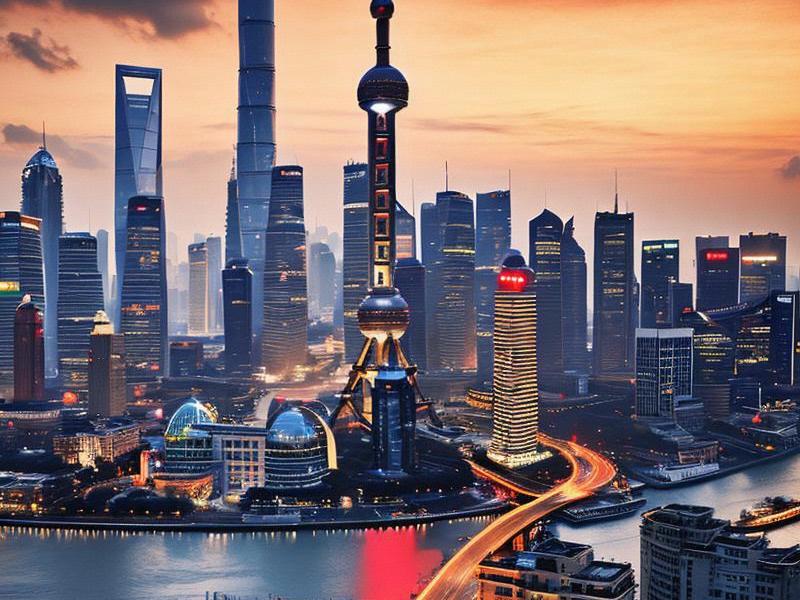This article delves into the multifaceted character of Shanghai, exploring its rich history, rapid modernization, economic prowess, cultural vibrancy, and its role on the global stage.

Shanghai, a city that has long been a symbol of China's economic and cultural transformation, is a place where the past and the present converge in a dazzling display of urban dynamism. Nestled at the mouth of the Yangtze River, Shanghai is not only the largest city in China but also a global financial hub that plays a pivotal role in the country's economic development.
The history of Shanghai dates back to ancient times, but it was during the 19th century that the city began to emerge as a significant international port. The Treaty of Nanking in 1842, which ended the First Opium War, forced China to open several ports to foreign trade, with Shanghai being one of them. This marked the beginning of Shanghai's transformation into a cosmopolitan city, attracting merchants and traders from around the world.
The Bund, a waterfront area in the heart of Shanghai, is a testament to the city's colonial past. Once lined with grand buildings of various architectural styles, it served as a hub for international commerce and diplomacy. Today, the Bund stands as a symbol of Shanghai's historical significance and its ability to blend tradition with modernity.
The Pudong district, on the other side of the Huangpu River, represents the cutting edge of Shanghai's modernization. Once a rural area, Pudong has been transformed into a skyline of glass and steel, home to some of the world's tallest buildings, including the iconic Oriental Pearl Tower and the Shanghai Tower. This area is a showcase of Shanghai's economic prowess and its ambition to be a global financial center.
阿拉爱上海 Shanghai's economy is characterized by its diversity and dynamism. It is a major hub for trade, finance, manufacturing, and technology. The city is home to the Shanghai Stock Exchange, one of the largest in the world, and is a key player in international trade. Shanghai's port is the busiest container port in the world, handling billions of tons of cargo annually.
The city's rapid economic growth has been fueled by its strategic location, robust infrastructure, and a business-friendly environment. Shanghai has established itself as a leader in innovation and entrepreneurship, attracting both domestic and foreign investment. The city's free trade zone and various economic development zones provide a fertile ground for businesses to thrive.
Culturally, Shanghai is a vibrant melting pot that has absorbed influences from all over the world. The city is known for its unique blend of traditional Chinese culture and Western influences, which is reflected in its architecture, cuisine, art, and fashion. Shanghai's art scene is particularly noteworthy, with galleries, museums, and cultural institutions showcasing a wide range of artistic expressions.
The city's culinary scene is a testament to its cosmopolitan nature. From traditional Shanghainese dishes like Xiaolongbao (soup dumplings) and Shengjianbao (pan-fried buns) to international cuisines, Shanghai offers a culinary experience that is as diverse as its population. The city's night markets and food streets are popular destinations for both locals and tourists.
上海龙凤论坛爱宝贝419 Shanghai's fashion scene is equally dynamic, with the city hosting numerous fashion shows and exhibitions. The French Concession area is known for its boutique shops, art galleries, and cafes, providing a glimpse into the city's stylish and sophisticated side. Shanghai Fashion Week is one of the most important events in the global fashion calendar, attracting designers, models, and fashion enthusiasts from around the world.
In recent years, Shanghai has also made significant strides in environmental sustainability and urban planning. The city has implemented various initiatives to reduce pollution, promote green energy, and improve public transportation. The Maglev train, which connects Pudong International Airport to the city center, is a testament to Shanghai's commitment to innovation and sustainability.
Shanghai's role on the global stage has been further enhanced by its participation in international organizations and events. The city has hosted numerous high-profile events, including the World Expo in 2010, which attracted millions of visitors from around the world. Shanghai's international airport and seaport are vital gateways for global trade and travel, connecting the city to destinations around the world.
The city's education system is another area of strength, with prestigious universities and research institutions that attract students and scholars from around the globe. Shanghai Jiao Tong University and Fudan University are among the top universities in China, contributing to the city's reputation as a center of learning and innovation.
上海花千坊龙凤 Shanghai's population is a microcosm of China's diversity, with people from all over the country and the world living and working in the city. This diversity has enriched the city's culture and contributed to its economic vitality. Shanghai's residents are known for their entrepreneurial spirit, adaptability, and cosmopolitan outlook.
Despite its rapid development, Shanghai has managed to preserve some of its historical and cultural heritage. The Yu Garden, a classical Chinese garden, and the Yuyuan Bazaar, a traditional shopping area, offer a glimpse into the city's past. These attractions, along with the city's numerous museums and cultural institutions, provide visitors with a deeper understanding of Shanghai's rich history and culture.
In conclusion, Shanghai is a city that embodies the spirit of modern China, with its rapid economic growth, cultural vibrancy, and global influence. It is a place where tradition and modernity coexist, creating a unique and dynamic urban environment. As Shanghai continues to evolve, it remains a beacon of China's aspirations and a symbol of the country's integration into the global community.
Shanghai's story is one of resilience, innovation, and transformation. It is a city that has embraced change while preserving its cultural identity, a testament to the resilience and adaptability of its people. As Shanghai looks to the future, it continues to be a model of urban development, setting the standard for other cities around the world.